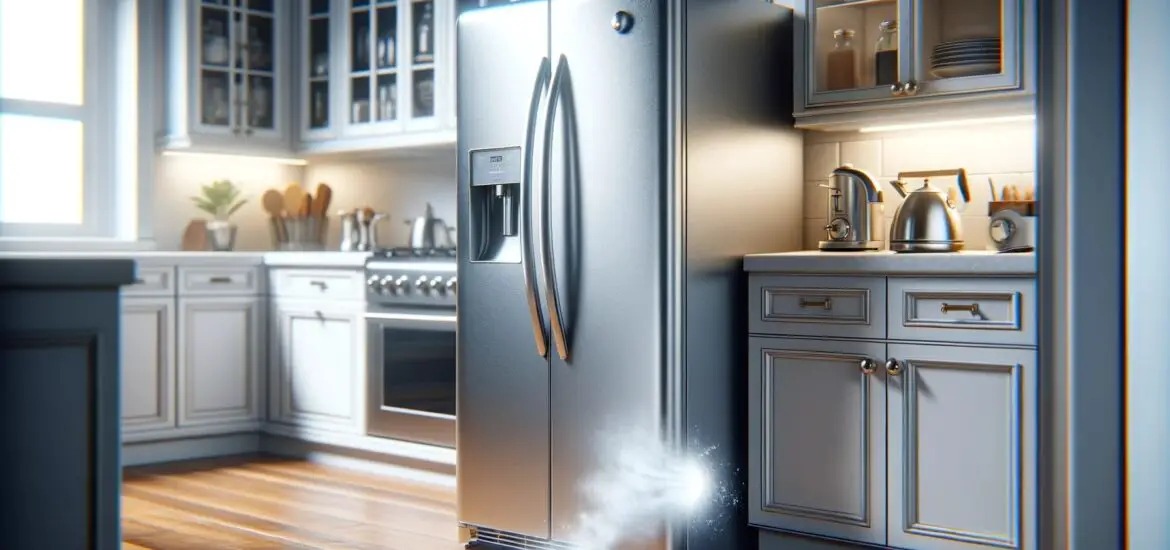This detailed guide provides step-by-step instructions on how to identify, fix, and prevent freon leaking from fridge.

Table of Contents
Can Freon Leak Inside a Refrigerator?
Freon can indeed leak inside a refrigerator. This is not a common occurrence but can happen due to various reasons like corrosion, physical damage, or a failure in the refrigerator’s sealed system. The sealed system consists of the compressor, evaporator, condenser, and connecting tubing.
Over time, these components can weaken or get damaged, leading to a freon leak. It’s important to understand that freon is not consumed by the refrigerator; rather, it’s continuously circulated. Therefore, if the level decreases, it’s almost always due to a leak.
Identifying Freon Leaking from Fridge
To identify freon leaking from fridge, look for several key signs. The most obvious is a decline in cooling efficiency. Your refrigerator may not keep food as cold as it used to.
You might also notice a strange odor, similar to the smell of ether or chloroform, coming from the fridge. Listen for a hissing sound, which is indicative of gas escaping from a small hole or crack.
In addition, the presence of oil residue on refrigerator parts, especially near the compressor or tubing, can signal a leak, as oil is carried with the freon throughout the system.
Safety Precautions
When dealing with freon leaks, safety is paramount. Freon is a toxic substance and can cause health issues if inhaled.
Always work in a well-ventilated area to minimize inhalation risks. Wear protective gloves and safety goggles to avoid skin and eye contact with freon.
If you feel dizzy, nauseous, or experience breathing difficulties while handling freon, seek fresh air and medical attention immediately. It’s crucial to remember that handling freon requires certification in many regions due to its environmental impact and health hazards.
DIY Repair Steps for Freon Leaking from Fridge
Repairing a freon leak yourself is possible but challenging and not recommended unless you have experience with refrigeration systems. If you choose to proceed, first ensure you have the proper tools. you’ll need a refrigerant leak detector, gloves, goggles, and a freon refill kit.
You can get this LotFancy Freon Leak Detector from Walmart.
Begin by locating the leak, typically found at connections or in the coils. For minor leaks, use a suitable sealant following the product’s instructions. If the leak is more severe, you may need to replace the damaged part.
Remember, dealing with refrigerants requires specific skills, and improper handling can worsen the leak or damage your fridge. In addition, in many regions, it’s illegal to handle refrigerants without certification.
Preventing Future Leaks
Preventing future freon leaks involves regular maintenance of your refrigerator. Clean the condenser coils annually to ensure they are free of dust and debris, which can strain the fridge’s cooling system.
Check the seals and gaskets on your fridge doors to ensure they are tight and not letting in warm air. Avoid overloading your fridge, as this can put extra pressure on the cooling system.
Regularly inspect the visible parts of the refrigeration system for signs of wear or damage. If you notice any issues, address them promptly to prevent them from leading to a leak.
When to Call a Professional
If you’re unsure about diagnosing or repairing a freon leak, it’s best to call a professional. Certified technicians have the knowledge, skills, and tools to safely handle refrigerants. They can accurately diagnose the problem, repair leaks, and refill the freon in your fridge.
Professionals can also check for any other underlying issues that might have caused the leak. Seeking professional help is especially important if you’re not certified to handle refrigerants, as improper handling can be both illegal and hazardous.